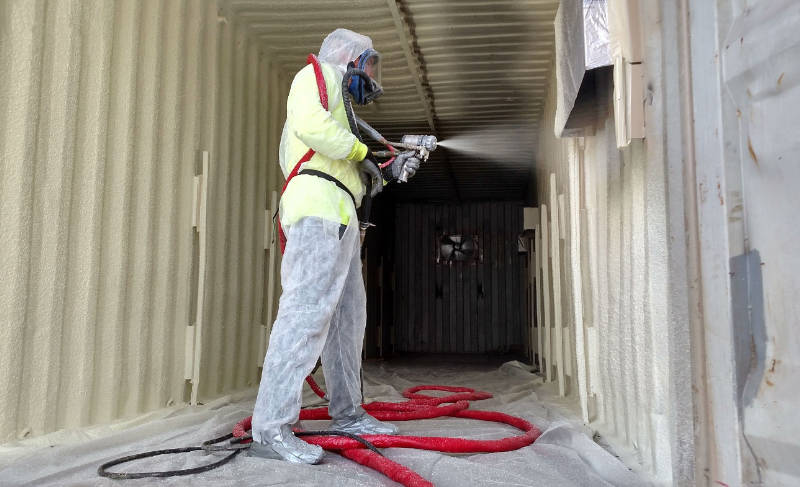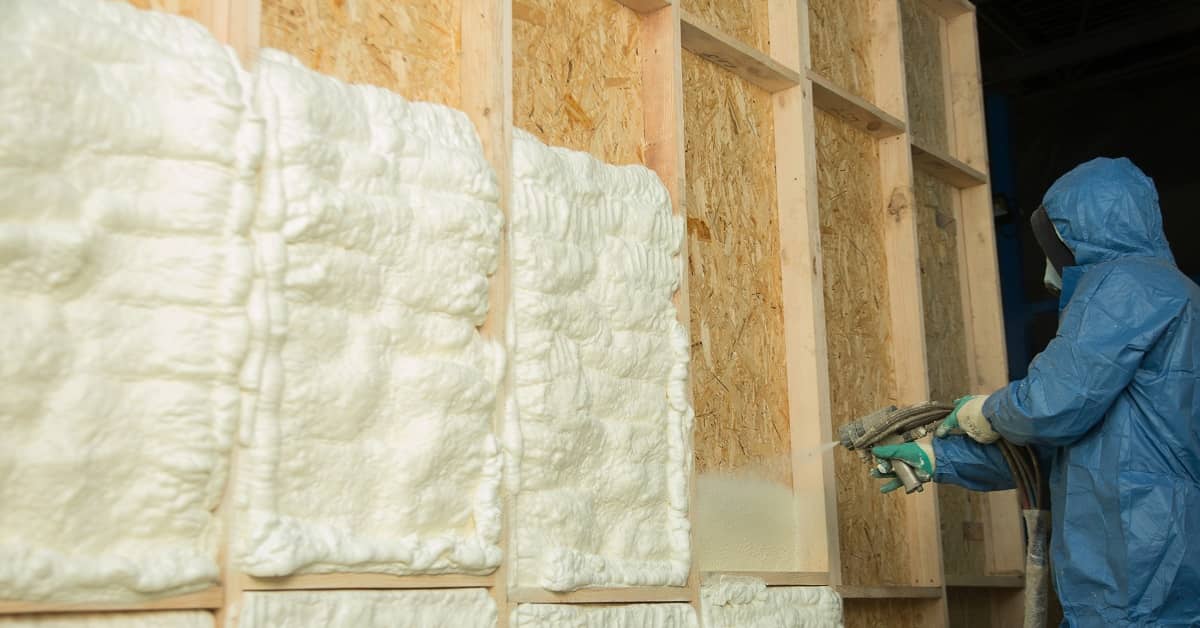Warehouses require insulation that supports wide temperature shifts, minimizes energy loss, and holds up under industrial conditions. Spray foam insulation, particularly closed-cell types, delivers benefits that meet these challenges. For commercial property owners managing large structures with high ceilings, open space, and variable usage, spray foam insulation offers long-term efficiency, reduced maintenance, and structural reinforcement.
This article explains why an expert commercial spray foam insulation service is suitable for warehouses, how it compares to other materials, and what practical outcomes property owners can expect.
Why Spray Foam Performs Well in Commercial Warehouse Environments
Spray foam insulation supports key operational needs in warehouse facilities: energy efficiency, air sealing, and durability under fluctuating environmental conditions. These properties contribute to better cost management and structural reliability.
Thermal Performance in Large Open Spaces
Large commercial warehouses often suffer from temperature inconsistency due to open layouts and high ceilings.
- Closed-cell spray foam provides an R-value of approximately R-6.5 per inch, making it one of the most thermally efficient insulation materials.
- It minimizes heat transfer across walls, ceilings, and roofing systems—helpful for spaces requiring consistent climate control for stored goods or equipment.
Air and Moisture Control
Warehouses located in humid or wet regions often struggle with condensation and internal moisture damage.
- Spray foam creates a continuous air seal, reducing airflow between conditioned and unconditioned spaces.
- Closed-cell variants add vapor resistance, helping prevent moisture buildup inside wall assemblies, ceilings, or roof decks.
Structural Reinforcement and Longevity
Closed-cell spray foam stiffens and strengthens framing systems.
- Applied directly to metal or wood framing, it enhances rigidity and adds resistance against external wind pressures—an important factor in exposed locations.
- It is inert after curing and resists mold, pests, and chemical degradation.
Comparison: Spray Foam vs Other Commercial Insulation Materials
Other insulation types used in commercial warehouse construction include fiberglass batts, rigid foam boards, and blown-in cellulose. While each has applications, spray foam offers a combination of thermal efficiency, durability, and air sealing that many alternatives lack.
| Feature | Spray Foam | Fiberglass Batts | Rigid Foam Board | Blown-in Cellulose |
|---|---|---|---|---|
| R-Value (per inch) | 6.0 – 7.0 (closed cell) | 2.9 – 3.8 | 4.5 – 6.5 | 3.2 – 3.8 |
| Air Seal | Yes | No | Partial | No |
| Moisture Resistance | High (closed cell) | Low | Moderate | Low |
| Structural Support | Yes (closed cell) | No | No | No |
| Durability | 30+ years | 10–25 years | 20–30 years | 15–30 years |
| Installation Complexity | Medium | Low | High | Medium |
| Fire Resistance Additive Req. | Often required | Often included | May be included | Often included |
Application Areas Within Warehouses That Benefit Most
Not all parts of a warehouse experience the same insulation needs. Specific areas benefit more from spray foam due to their exposure and thermal demands.
Roof and Ceiling Systems
Roofs account for major energy loss, especially in older or metal warehouses.
- Spray foam can be applied under the roof deck to create a sealed barrier, reducing radiant heat gain.
- In retrofit projects, foam can be sprayed directly onto the underside of metal roofing without removal.
Wall Cavities and Loading Zones
Large doors and thin wall systems introduce air leaks and external exposure.
- Spray foam fills voids around dock doors, windows, and panel seams to limit outside air intrusion.
- Continuous wall application creates a seamless insulation layer across framing and junctions.
Mezzanine Levels and Conditioned Storage Areas
Warehouses that include temperature-controlled zones or upper-level storage platforms need insulation with high thermal resistance.
- Closed-cell foam maintains temperature consistency and prevents energy bleed across floors or partition walls.
- It improves energy performance in mixed-use spaces such as offices or climate-sensitive storage within a warehouse.
Fire Resistance and Code Compliance
Commercial insulation must meet specific building code standards for fire safety and material performance.
Fire Retardant Coatings
Closed-cell spray foam generally requires a thermal or ignition barrier depending on where and how it’s installed.
- Intumescent coatings are often applied post-installation to meet code requirements.
- Areas with exposed foam—such as mechanical rooms or open rafters—require careful material selection and additional fire-resistant layers.
Code Compliance in Commercial Buildings
Spray foam insulation is tested to comply with ASTM E84 standards for flame spread and smoke development.
- Fire code inspectors typically require documentation and on-site verification of material ratings.
- Certified contractors provide product data sheets and installation details to support code clearance.
Energy Efficiency and Operating Cost Reductions
The ability to reduce energy costs is a major advantage for commercial property owners. Spray foam insulation directly impacts energy use in conditioned warehouses.
HVAC Load Reduction
Air leaks and poor insulation force HVAC systems to work harder to maintain internal temperatures.
- By sealing air gaps and providing high thermal resistance, spray foam lowers heating and cooling demands.
- Systems operate more efficiently, often reducing utility bills by 20–40% depending on insulation quality.
Seasonal Comfort and Internal Environment Control
Warehouses used year-round benefit from insulation that maintains usable working temperatures.
- Spray foam supports stable temperatures across summer and winter cycles.
- It prevents hot and cold spots, improving employee comfort and protecting stored goods.
Conclusion
An expert spray foam insulation contractor offers warehouse owners a material that supports energy control, structural durability, and long-term value. Its high R-value, air-sealing properties, and moisture resistance make it ideal for large open structures with variable usage and climate needs.
Compared to conventional insulation, spray foam provides longer service life and reduced operational costs, particularly in climates with wide seasonal shifts. For facility managers and developers, it’s a practical upgrade that aligns with performance, safety, and regulatory standards.
FAQs
How long does spray foam insulation last in a commercial warehouse? Closed-cell spray foam typically lasts over 30 years with minimal degradation. Its resistance to moisture, pests, and air infiltration extends its effectiveness well beyond other common materials.
Is spray foam suitable for metal warehouse buildings? Yes. Closed-cell spray foam adheres well to metal surfaces and helps reduce thermal bridging, which is a common issue in steel-framed buildings.
Does spray foam require additional fire protection in warehouses? Most commercial applications require an ignition or thermal barrier over exposed foam. Fire retardant coatings are applied post-installation to meet local codes.
Can spray foam insulation help with soundproofing inside a warehouse? Spray foam does offer sound dampening, especially in large echo-prone spaces. It reduces noise transmission through walls and ceilings, particularly when installed in partitions or mezzanines.
Is spray foam insulation better than fiberglass for commercial roofs? Spray foam outperforms fiberglass in air sealing, moisture control, and R-value per inch. For commercial roofs exposed to heat and humidity, it provides superior long-term performance.
Reviewer: Jack Parker, a spray foam professional with 7 years of experience, reviewed this post and helped improve sections dealing with brand clarity and customer communication.


